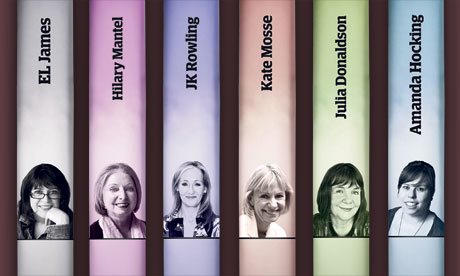An outpouring of erotica, a historic Booker double win, and a self-publishing revolution: women have changed the world of books this year

The game changers … six women who dominated publishing in 2012
EL James
Four years ago a dissatisfied TV executive was inspired by Stephenie Meyer's Twilight novels to start writing steamy online fan fiction about the leading characters in which sparkly-skinned vampire Edward and bold virgin Bella were made over as an entrepreneur and a college graduate. If the narrative of the first Twilight books was powered by heavy-breathing abstinence and the revelation that good vampires wait until marriage, online forums were where readers could let rip.There were thousands of similarly sexed-up Twilight stories on the web, but in May 2011 – after some name changes and minor tweaks – a tiny Australian publisher, Writer's Coffee Shop, "talked James into" publishing her BDSM fantasies as an ebook, which was then picked up by Random House in the US. Rumours about copies being exchanged with blushes on the school run or borrowed from hairdressers snowballed into reports of New York hardware shops running out of rope as the book climbed the New York Times bestseller lists. The trilogy was rushed into print in the UK this April and by August, Fifty Shades of Grey, the story of damaged billionaire Christian Grey and eager college student Anastasia Steele, a love affair-cum-therapy session-cum-shopping spree played out against their erotic relationship, was the bestselling book in British history.
Like Harry Potter and The Da Vinci Code, it burst the banks of the publishing world; people were buying it who didn't otherwise buy books, if only to find out what the fuss was about. It single-handedly re-ignited the women's erotica market, which had withered when Black Lace covers began to look dated, as well as tapping a whole new readership who didn't know or care that – as those in the know sniffily pointed out – you could find much better erotica, for free, on the web. Thus it was a victory for the paperback, as well as for ebooks and self-publishing.
The Kindle has been credited with removing the embarrassment from reading dirty books, but what Fifty Shades revealed is that erotica isn't shameful any more so long as enough people are reading it already, and it's got a tasteful jacket (James wanted restrained covers, having herself squirmed over reading lurid-looking romances on the tube).
In literary terms, the books are atrocious: whole blogs have been dedicated to pulling them apart sentence by sentence. Christian, like Edward in Twilight, is a stalkerish control freak; Anna a bubble-headed klutz who is constantly biting her lip or communing with her inner goddess. The BDSM sex – which is both the book's USP and the only thing it has in common with classic erotica – has been simultaneously decried as a misogynistic manual for domestic violence and criticised for being too tame (the possibility of anal sex is put to one side early in book one, while the narrative arc of the trilogy is unusual in moving from the deviant towards the cosy).
Read the full article at The Guardian




